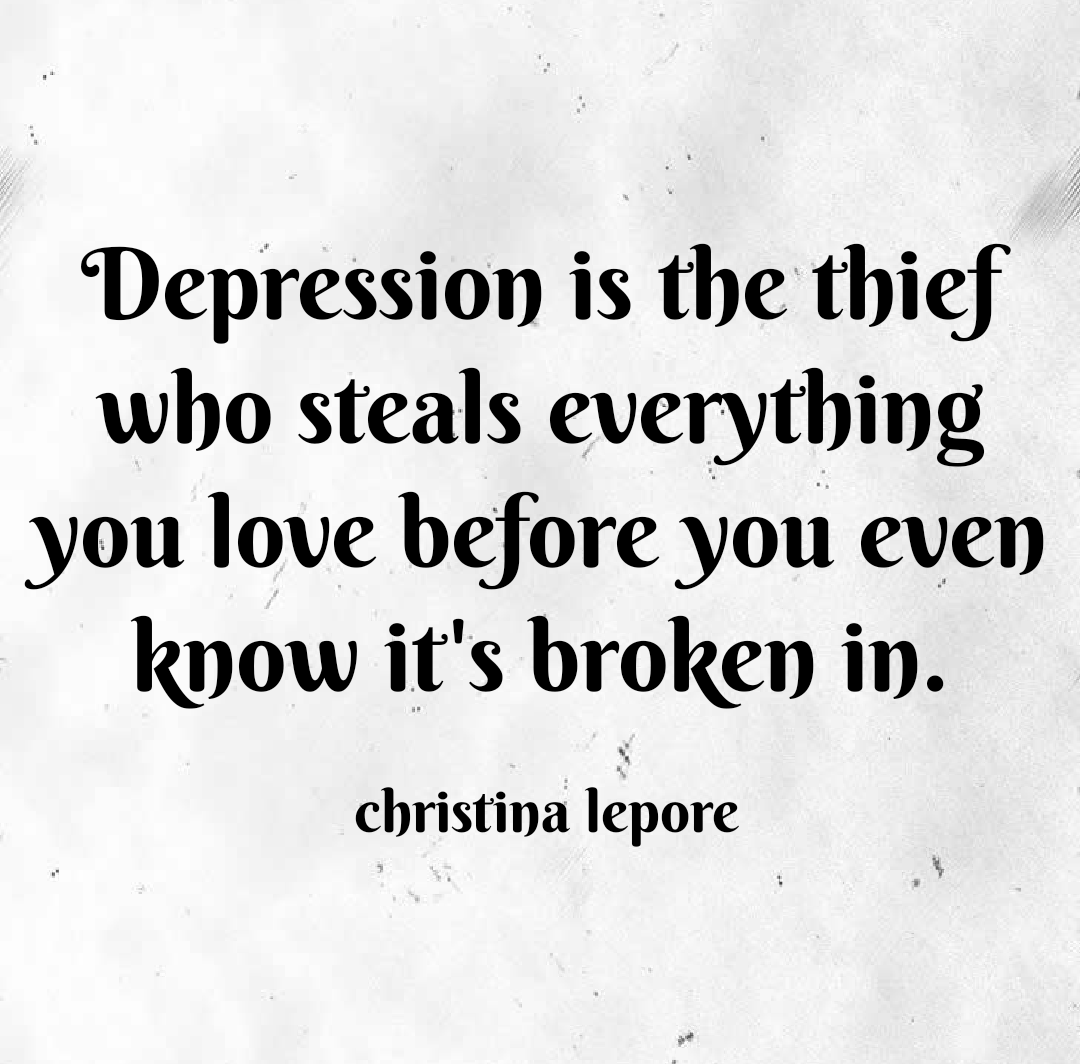Has anyone ever brought you a hot dish or freshly baked cookies when you were sick?
It’s so easy to console others and ourselves when we’re fighting off viruses or post surgery, right?
Well, clinical depression, major depressive disorder, and Bipolar 1 and 2 are illness, too. In fact, they are brain disorders that affect every part of the human condition—from the mind, to the body, and right down deep into the soul. And they can lead to anything from dysthymia (chronic low mood) to yes, even death.
But many in this educated and enlightened age, where information is literally available at the tip of our fingers, are still afraid to tell others.
The “D” word: it’s whispered about and misunderstood. It’s shamed. It’s stigmatized. It’s the eye roll at family gatherings, and the thing people stop talking about when you enter the room. It’s the “shush,” then silenced by small talk.
And yep, it’s the illness everyone seems to think they have a formula to fix.
“They just need to take medication or go to yoga or meditate or change their diet or do that exercise regime or read that self-help book. Or align their chakras or take this supplement or create that vision board or do that therapy or attend that motivational conference. Or (and this is my favorite…note the sarcasm) just think positive.”
And I agree. A lot of these suggestions may help, but do you honestly think those who are dealing with depression haven’t thought of or tried them already?
During my worst depressive episode, back in 2011, I would have literally eaten dog sh*t if there was evidence somewhere, anywhere that someone had tried it and it worked. I would have put a heaping scoop of poop and some frozen berries in my Magic Bullet and drank it three times a day.
So before you send that link to your depressed friend about connecting with their inner child or their higher self, stop and ask yourself if you would send it to a loved one with any other chronic, disabling, relapse/remission type of illness.
When a person is sick, with even a bad case of the flu, people reach out to help. Friends make homemade soup or bring over a little basket of soft tissues, cold medicine, and herbal teas to soothe your sinuses.
When a person has surgery, friends make precooked meals so they can rest and recuperate and not have to spend time in the kitchen while they’re recovering. It’s a courtesy. It’s an act of kindness and very much appreciated.
When a baby is born and the mother is in the hospital, family sends flowers to congratulate her on the new addition and on a job well done, even when she’s not sick at all. We still acknowledge her labor.
When I had major surgery, or when we had a house fire, or when I was in the hospital postpartum, people showed up in a big way.
My mom was there to help me with the kids. My sister baked her famous chocolate chip cookies. My mother-in-law, at the time, made my favourite homemade fettuccine. Friends called.
Oh, but depression. Depression is not a casserole illness.
There are no meals or care packages or flowers. In fact, most people don’t even call to check in, or they do at first, but over time they give up. Maybe you aren’t getting well fast enough, so they back up and out of your life. And oh my God, does it burn.
It settles in deep, breaks the heart, and gets under the skin. It becomes raw and painful and, eventually and without intention, it grows into self-loathing and, to be honest, a dash of resentment, too.
And when I ended up in that hospital—yep, the mental hospital, the cuckoo’s nest, the nut house, the loony bin, the happy hills Hilton—with Stage 4 depression, tottering between life and death, with life being a 100-pound girl versus Arnold on the other side, the avoidance only got worse.
I was two hours from home and 56 days in intensive, gut-wrenching treatment. My now ex-husband brought my children to see me twice—me, their momma, who had never been away from them once.
And drum roll please! The number of visitors? Zero.
Later, I asked why. The answers shocked me.
“Well, we didn’t know if you were allowed visitors.”
What? I wasn’t contagious. You didn’t have to don a mask, gloves, and gown. Did you think you were going to catch it and bring it home?
“Well, we didn’t know if they let people in?”
What? I may have gone and lost a marble, or two, but I hadn’t committed a crime, for God’s sake. I was not in freaking jail.
“Well, we thought maybe you wanted to be alone.”
What? I had felt alone for years. What I needed, more than anything, was connection.
“Well, you never come see us, so…”
The quid pro quo, the trade, the something in return for something. What? Yes, I cancelled a lot of plans, turned down that invitation, or didn’t show up to that birthday party because I couldn’t even leave the house! I’m afraid all the time, and mostly I am afraid of you judging me. I want to be included. I miss you all terribly. I already know I am an unreliable friend, the black sheep, the sum total of the excuses I’ve made! I admit it all, and will humbly fall on my sword for you, but if I was sick with anything else, would we honestly even be having this particular discussion?
“Well, we just didn’t know what to say!”
And there it is—the most honest answer I think I’ve ever heard.
Thank you. Now we have something to work with, and here it is:
If someone you love is living with depression, you do not have to say anything.
Hold their hand, even though it may tremble.
Listen to them vent without interrupting with platitudes or telling them “it could be worse.”
Allow them to cry in your presence, even though it makes you uncomfortable as hell.
Let them speak freely, without feeling the need to give advice or come up with a solution.
Then, just love them. Please just love them and you will never go wrong!
And finally, bake the brownies, send the cheapest carnation you can find, write a note on a card from the dollar store. Keep including them in every family function. Keep asking them out for coffee, even if they have declined 20 times. Keep inviting them, even though you don’t think they will come, because one day—maybe tomorrow, maybe next year, when they are feeling better—they will say yes to all of it.
Nope, you do not need a degree in psychology.
You do not need to fix them. They are not broken.
They are sick. Period. Full stop.
All you need to do is follow the golden rule: Treat others the way you would hope to be treated.
I’m willing to share all this because it’s time to shatter the f*cking stigma. And I hope you will share as well, because if the statistics are indeed accurate, it is far more likely than not that one day it may be you or someone you love who needs others to help you heal.
Compassion—please, pass it on.
~







Read 25 comments and reply